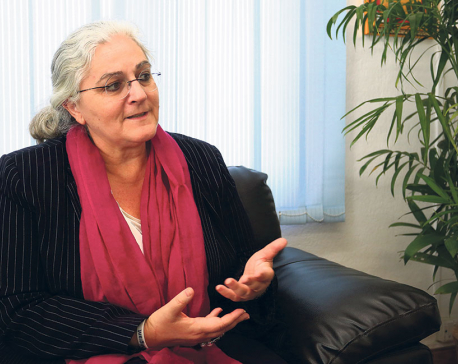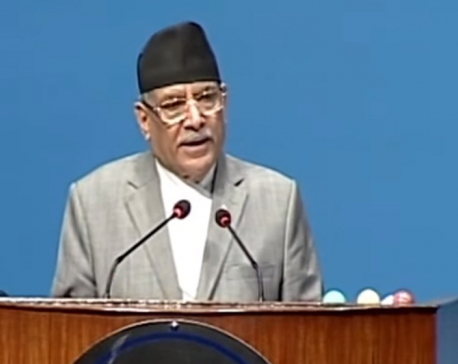
OR

More from Author
Securing the rights of family forest farmers and increasing their access to local resources should be major priority of the government
Family forests have played a lead role in economic transformation of Nepali farmers for decades. But slowly, this is getting replaced by various other forms of income generation and livelihood options. Majority of Nepali youths are in foreign land and others have migrated to city areas in search of opportunities and services. This has emptied rural villages of Nepal and along with it people have turned more materialistic. They are seeking more luxurious lives and do not pay attention to the land they own. This negligence has not only left the land abandoned and barren but also affected the surroundings leading to climate change hazards. If we could revitalize family forestry, it could reverse some of these trends.
Nepal lacks specific researches on family forests but according to a research by Gillmore and Shah Rs 1.6 million was collected from only one rural municipality just from the income of forest resources. Another data shows in 2017, 40 percent income was generated from family forests. Total of 33 percent of land in Parbat and 38 percent in Kaski, for example, have been left abandoned. According to a 2012 research, total 33.27 percent of land in the hills and 33 percent in Tarai is abandoned. If such lands can be used for plantation and family forestry, it will help the families generate incomes.
Federal set up has brought a lot of opportunities for development. Securing the rights of family forest farmers and increasing their access to the local resources should be the major priority of the government. Because family forestry has proved to be more inclusive and has broader ownership as it includes women of the families, even though they might not own land.
Family forestry allows owners to protect, manage and utilize their forests and treat them as source of economy and environmental conservation. Family forestry contributes to maintaining forest covers. But due to existing policy hurdles, family forest farmers have not been able to reap economic benefits. The lack of appropriate legal framework for officially registering family forests is another major hurdle. Also, the government policy is silent on which species of trees such farmers can grow, harvest, sell and transport. A data shows that till 2017, only 3,753 private individuals had registered 2,902 hectares of forests as private forests.
In many places family forests have been left abandoned because people are not much interested in agro-based farming. A huge chunk of Nepali population is leaving the country every day. Thus there is a shortage of labor for forest farming. Family forestry needs to be encouraged to increase fertility of barren land and preserve eco system. If the country can do this much, family forests can be a reliable source of income and sustainable livelihood promotion.
Family forests can become the backbone of green economy and employment. But development partners and Ministry of Forests and Environment (MoFE) have not accorded it much importance. Thus we need to have an in-depth understanding of opportunities and challenges of family forestry. There already is hectic registration process. Most distressingly, family forest farmers cannot cut down Sal, and many other species of trees, while other sectors can do so. This is one reason why people are discouraged from farming forests. By promoting family forestry, Nepal can increase amount of carbon compensation that it receives. It also contributes to biodiversity conservation and carbon sequestration. Nepal has already ratified United Nations Convention of Biodiversity Conservation (UNCBD) and UN Framework Convention on Climate Change (UNFCC) but it has not been able to receive adequate carbon compensation for biodiversity protection and carbon sequestration due to lack of clear agendas.
Promoting family forestry through insurance provision, collateral and grants of banks can be one solution. Easy registration process will also help make Nepal self-reliant on wood products. Besides, allowing harvest, transportation and selling of woods and wood based products should be allowed by ward offices for family forest farmers. There should be family forest friendly laws and policies in place. All this will contribute to creating better environment for nurturing family forestry paving the way for sustainable livelihood, green economy and green employment.
Giri is Chairperson of Association of Family Forest Owners, Nepal (AFFON). Dahal is Family Forest Activist
You May Like This

Migration is good. It just has to be done safely
December 18 is marked as International Migrants Day every year. Although both domestic and international migrations have been taking place... Read More...

Social trend of migration effecting more migration
KATHMANDU, Feb 9: Rather than solely due to the lack of job opportunities in the home country, the existing social trend... Read More...

Govt’s attention has been drawn toward recruitment of Nepali youth in Russian Army: PM Dahal
KATHMANDU, June 23: In the meeting of the House of Representatives (HoR) on Friday, members of parliament (MPs) asked questions... Read More...



Just In
- 550,000 people acquire work permits till April of current fiscal year
- Fixing a win by outlawing dissent damages democracy
- MoHP cautions docs working in govt hospitals not to work in private ones
- Over 400,000 tourists visited Mustang by road last year
- 19 hydropower projects to be showcased at investment summit
- Global oil and gold prices surge as Israel retaliates against Iran
- Sajha Yatayat cancels CEO appointment process for lack of candidates
- Govt padlocks Nepal Scouts’ property illegally occupied by NC lawmaker Deepak Khadka










_20220508065243.jpg)



Leave A Comment